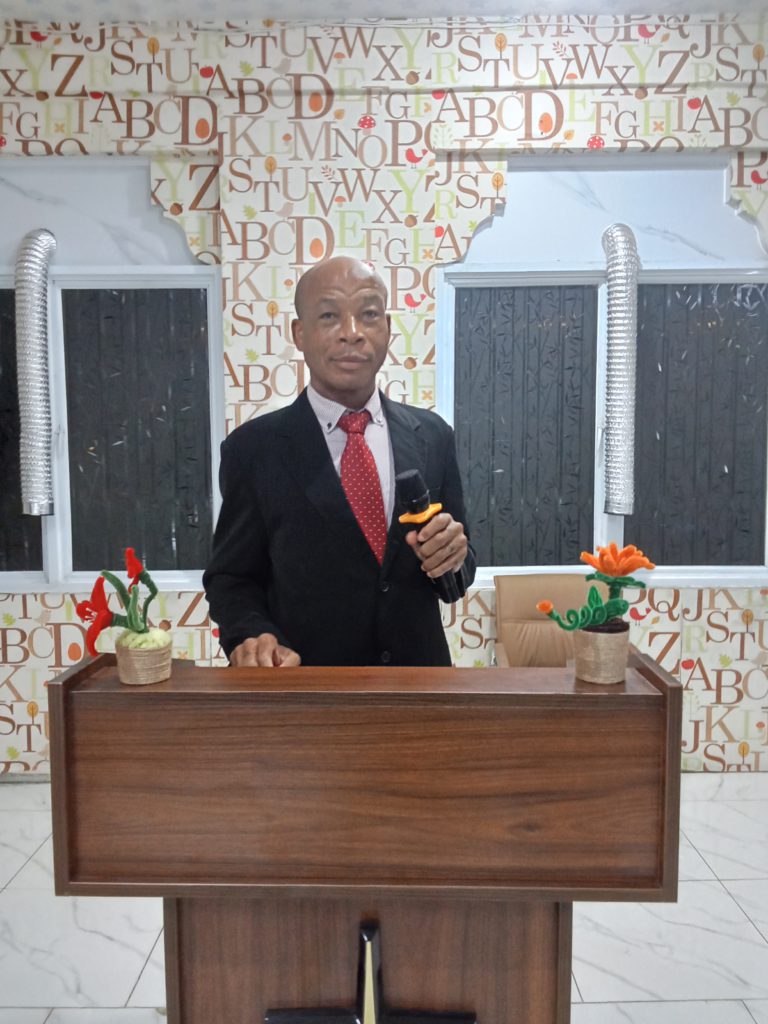“Wherefore the rather, brethren, give diligence to make your calling and election sure” (1 Peter 1:10)
The apostle Peter begins with faith: “like precious faith” in verse 1. This faith is the gift of God: we have obtained it (it has been allotted to us, is the idea). We have obtained it—it has been allotted to us—through the righteousness of God, which is theological shorthand for the work of Jesus Christ. By faith we are complete: we have “all things that pertain unto life and godliness” (v. 3); we have “exceeding great and precious promises” (v. 4); and we are even “partakers of the divine nature,” having escaped the corruption of the world” (v. 4).
To that faith the apostle urges us to be diligent—to give all diligence—to add virtue, knowledge, temperance, patience, godliness, brotherly kindness, and charity” (vv. 5-7). The idea of “add” is to supply lavishly from the supplies that we have by God’s grace in Jesus Christ. The verb is used of a patron of the arts supplying an orchestra or a choir so that it gives a beautiful performance; similarly, when we add these things to our faith we bring glory to our God. In verses 8-9 the apostle adds an incentive and a warning. The incentive is that “if these things—virtue, knowledge, temperance, patience, godliness, brotherly kindness, and charity—are in us and abound our faith will not be barren (that is, idle/lazy/unproductive) or unfruitful; but our faith will be active and fruitful to the glory of God and the welfare of the neighbor. The warning is that “he that lacketh these things—virtue, knowledge, temperance, patience, godliness, brotherly kindness, and charity—is spiritually shortsighted and suffers from forgetfulness: he has forgotten that he has been purged from his sins.
To that warning the apostle gives an alternative in v. 10: Wherefore the rather, brethren, give diligence to make your calling and election sure.” The alternative to spiritual shortsightedness and forgetfulness is to make our calling and election sure.
Election and Calling
The apostle mentions two things in verse 10—two aspects of our salvation—calling and election. Although the apostle speaks of “calling and election,” we will start with election. Election is God’s act of choosing us unto everlasting salvation. The word “elect” means “to choose out for oneself” or “to select.” In election there are always options: in this case the options are people. Before God’s mind stood all the people whom he would create—from Adam all the way to the last human being who will live. Some of those people God chose, while the rest God rejected. God’s act of choosing some is election, while God’s act of rejecting the rest is reprobation.
It is important to emphasize that election is personal: God chose persons; he did not choose conditions or states of being, but persons. Canons 1:10: “Election does not consist herein that out of all possibilities and actions of men God has chosen some as a condition of salvation, but that he was pleased out of the common mass of sinners to adopt some certain persons as a peculiar people to himself.” And the text itself refers to persons: “make your calling and election sure.” “Your!” Other passages teach the same thing: “According as he hath chosen us in him before the foundation of the world” (Eph. 1:4).
This election of God has certain characteristics or qualities.
First, election is eternal: God did not make this choice in time after we were created, after we had begun to do good or evil, but he set his love upon us and chose us before time began. “But we are bound to give thanks alway to God for you, brethren beloved of the Lord, because God hath from the beginning chosen you to salvation through sanctification of the Spirit and belief of the truth” (2 Thess. 2:10). “Chosen us in him before the foundation of the world” (Eph. 1:4).
Second, election is unconditional. When we choose something or someone, we do so because of some quality in the thing/person chosen. The reason for God’s choice is not in us; it is in him: it is because of his own good pleasure. “Having predestinated us unto the adoption of children by Jesus Christ to himself according to the good pleasure of his will” (Eph. 1:5).
Third, election is in Jesus Christ: he is the elect one (God chose him to be the Head of his people) and we are chosen in him, chosen to be his people, chosen to be his church, and chosen to be his sheep. Therefore, we are given to him, and he suffers and dies for us in order to make full satisfaction for our sins.
There is, therefore, nothing surer and nothing more certain than election. Election is God’s eternal, sovereign, unconditional, unchangeable choice of his people. “Who shall lay anything to the charge of God’s elect? It is God that justifieth. Who is he that condemneth? It is Christ that died; yea rather, that is risen again, who is even at the right hand of God, who also maketh intercession for us” (Rom. 8:33-34).
Calling is the address of God’s voice to the heart of the elect, regenerated sinner to bring him to conscious faith. Election is God’s eternal choice; whereas calling is God’s speaking by his voice to the heart of the elect, regenerated sinner in time. Paul writes, “[God] hath saved us and called us with a holy calling not according to our works, but according to his own purpose and grace which was given us in Christ Jesus before the world began” (2 Tim. 1:10). Elsewhere he writes, “Whom he did predestinate, them he also called” (Rom. 9:30). The purpose and grace of God are before the world began, but the calling happens in time and history, in the lifetime of the elect sinner. There was a point in time, dear reader, when you were called, a time when God addressed your heart, a time when God drew you to himself, and a time when by grace you came in faith to Jesus Christ.
In calling his people God adopts a certain order: regeneration, calling, faith. Although we are eternally God’s elect, and therefore eternally the objects of his love and favor, we are born into this world as sinners; indeed, we are conceived and born in sin and, therefore, we begin life “dead in sin.” Therefore, the first step must be regeneration. God makes us alive; then, having made us alive, he calls us: “Come,” he says, in the preaching of the gospel and “Come,” he says, as the Spirit addresses our hearts. Jesus speaks of this in John 6:44: “No man can come to me, except the Father which hath sent me draw him, and I will raise him up at the last day.”
The fruit of the calling is that we come in conscious faith to Jesus Christ. God’s election is sure. God’s calling is equally sure. God, says Paul, “quickeneth the dead, and calleth those things which be not as though they were” (Rom. 4:17). And elsewhere he writes, “The gifts and calling of God are without repentance” (Rom. 11:29), which means that God does not change his mind about those whom he calls.
Making Them Sure
Given that there is nothing surer or more certain than election and calling—they are rooted in the eternal good pleasure and purpose of Almighty God—we might wonder: why does the apostle write, “Give diligence to make your calling and election sure.” The meaning is not, “Make them sure for God,” but “Make them sure for yourself.” That, too, is why the order is calling and election. The apostle wants his readers to know that they are called and elected by God.
This means, first, that it is possible to know and that it is normal to know. In some churches, even some Reformed churches, the members do not know whether or not they are called and elected. In fact, the preaching is such that they are encouraged—even commanded—to doubt. If you ask such people they might say, “I faithfully attend church twice every Sunday, and I try to live a godly life; and I think that I believe in Jesus, but I do not know if God has really called me or if I am an elect.” There is no more miserable existence for a child of God than that: to be a child of God and not to know it; to be a child of God and to be constantly unsure and doubting it; to be a child of God and to be afraid that you are not really called out of darkness into God’s marvelous light; to be a child of God and to be afraid that you are reprobate, heading for hell, not heaven.
The preaching—and believing—of doubt is Arminianism; it is not the Reformed faith; the Canons of Dordt are opposed to a theology of doubt. “The elect in due time, though in various degrees and in diff measures, attain the assurance of this their eternal and unchangeable election” (Canons 1:12). The Arminians taught, “There is in this life no fruit and no consciousness of the unchangeable election to glory, nor any certainty” (Canons 1.R.7). “Of this preservation of the elect to salvation, and of their perseverance in the faith, true believers for themselves may and do obtain assurance according to the measure of their faith” (Canons 5:10). “This assurance is not produced by any peculiar revelation contrary to, or independent of the Word of God” (Canons 5:10). The Arminians taught, “Without a special revelation we can have no certainty of future perseverance in this life,” which the Canons call “the doubts of the papist” (Canons 5:R:5). Peter says, “Wherefore the rather, brethren, give diligence to make your calling and election sure,” which he could not—and would not—write if assurance of salvation were impossible.
This, too, is a personal matter: “Make your calling and election sure.” The only person’s calling and election you can make sure is yours. The apostle does not write to the pastor or the elders, “Make the calling and election of the congr


